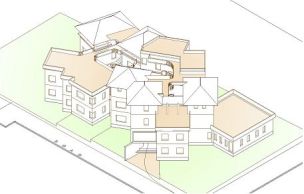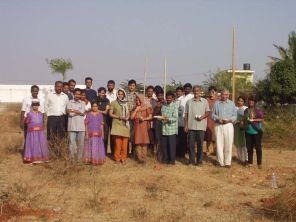|
Vol 2:2
|
|
March 2004
|
 Ashoka Trust for Research in
Ashoka Trust for Research inEcology and the Environment www.atree.org |
Branches@ATREE(A
Bimonthly Newsletter)
|
Ashoka Trust for Research in Ecology and the Environment |
|
Bangalore
Office Delhi
Office Eastern
Himalayas Office Advisory
Board Executive
Board Executive
Staff |
ECO-INFORMATICS CENTER AT ATREE ATREE is happy to announce the setting up of an Eco-informatics Centre which is a joint initiative of ATREE and UAS. It is supported by Hewlett-Packard through a major equipment grant. The centre evolved from a workshop on ‘Eco-Informatics’ held in Bangalore on 9-11 June, 2003. This workshop brought together scientists from the United States and India to exchange information on their respective ongoing programs while exploring the potential and specific requirements for integrating various Eco-Informatics tools. Eco-Informatics is a newly emerging area. It deals with the generation of and value addition to databases developed through the application of information technologies. It also covers data on diversity and spatial distribution of genes, populations, species, ecosystems and ecosystem services. The objective is to provide better conservation and management of biological diversity, natural resources and ecosystem services. The major components of the center will be 1) assemblage and organization of databases: geophysical, bioresources and socio-economic, 2)work in computational ecology and 3) Applications of eco-informatics in areas such as conservation planning and management and mapping of ecosystem services . The Center is also expected to generate training modules to invest in human resources required to develop the field in India. The equipment grant from HP will fulfill one of the important requirements of the ATREE-HP Eco- Informatics Network initiative. We are working hard to raise resources to cover the other costs such as a fast internet connectivity, required human resources and software. We expect that this will be achieved within the next |
|
six months. Initially, the emphasis will be on the Western Ghats hotspot but the scope will be extended to the rest of India in a phased manner. The ATREE-UAS-HP Eco-Informatics Network initiative will contribute directly to the World Heritage Biodiversity Program that we expect to work on with the UN Foundation. All synergies between this center and other such programs and projects based in the Western Ghats and elsewhere will be explored and implemented. - Jagdish Krishnaswamy
GROUND BREAKING CEREMONY AT ATREE BUILDING SITE. The
trustees and staff of ATREE gathered at the new building site at
Royal Enclave near Jakoor, for an NEW STAFF Nitin Rai has joined ATREE as a post doctoral fellow. He completed his PhD from the Department of Biology at Pennsylvania State University and will be working with Dr. Bawa on Non Timber Forest Product research and Policy. |
SOUTH ASIAN WORKSHOP IN NEW DELHI
On "Accelerating Implementation of National Forest
Programmes (NFPs): Strategies and New Directions” The workshop objectives were to:
To achieve the above objectives, the workshop deliberated on IPF/IFF (Intergovernmental Forum on Forest) proposals for implementing NFPs, country capacity building needs, |
| strengthening of stakeholders
participation, pro-poor actions, cross- sector linkages and other
related issues. Apart from the presentation of countries papers reviewing
the respective NFP, the selected speakers presented in-depth analysis
of thematic issues in different technical sessions; and group work
provided opportunities to review and recommend action under various
identified themes and sub-themes. ATREE acknowledges with thanks the support extended by MoEF and FAO Representatives of SAARC Countries (Bhutan, Sri Lanka, Nepal, Bangladesh and India) in facilitating different phases of the workshop. The Organizers plan to bring out the proceedings of the workshop by end of May 2004. The summary of proceedings and all presentations made during the workshop has been already compiled in a CD and the same can be obtained on request from Dr. Bhaskar Sinha, fellow. (bsinha@atree.org) -Bhaskar Sinha FRENCH STUDY TOUR OF KARNATAKA ATREE organized a study tour for the Association Voyage de Fin d’Etudes, Ecole Superieure du Bios, Nantes, France from February 29- March 8, 2004. Seventy four final year students, 3 faculty and 2 journalists visited Karnataka for a 8-day activity-filled tour learning about wood science and technology in South India with an emphasis on conservation. - Joyeeta Das UNESCO-FORD WATERSHED PROJECT The ATREE watershed team welcomed Dr. Mike Bonell, eminent hydrologist and Chief, Hydrological Processes and Climate change, UNESCO Head-quarters, Paris who visited the field sites instrumented by the ATREE team in Bandipur National Park. Dr. Bonell was accompanied by Dr. R. Jayakumar, Programme Officer for Hydrology, UNESCO-New Delhi as part of the annual review process of the UNESCO-FORD Dr. Mike Bonell expressed satisfaction at the work done under difficult |
conditions
and gave valuable advice on rainfall-run-off measurements and stream
channel characterization.
NATIONAL WORKSHOP ON CONSERVATION AND LIVELIHOODS ATREE organized a national workshop on January 30-31, 2004 in Bangalore, as part of a Ford Foundation supported study on Conservation, Enterprise and Livelihood, being coordinated by Dr. A. J James. The workshop discussed the urgent need to evaluate natural resource-based community-organized rural enterprise on the triple baseline of economic viability, social equity and environmental sustainability. Following the discussions based on the invited presentations on specific case studies from all over India and Nepal, the 40 odd participants broke into smaller groups to discuss these issues in more details. Headway was made on identifying indicators to assess the triple baseline, which were discussed further in the plenary discussions on the second day. The findings from the workshop will inform the design of the case studies that are to be conducted from April to June as part of the on-going study.
“PLASTIC ALISI, PRAKRITI ULISI” This is one
of the many slogans composed by the |
|
temple.
En route, the participants gathered up 40-45 gunny bags of plastic
garbage. The collective effort that has resulted in this action campaign is an excellent start to the BRT Environmental Education program. It is also an encouraging example of local-community-involvement in restoring conservation values. - Ankila Hiremath PRESENTATIONS BY ATREE STAFF Velavan, T.P.,
Udayakumar, D., Hendre, P.S., Shanker, K., Choudhury,
B.C., Singh, L. and Aggaarwal, R.K. poster presentation on ‘Development
and characterization of novel microsatellite markers from the olive
ridley sea turtle (Lepidochelys olivacea)” at the 24th
annual symposium of sea turtle biology and conservation, San Jose,
Costa Rica, 22-29, February 2004 Shanker, K. ‘Review of olive ridley turtles in Orissa, India” at the second meeting of the signatory states, Memorandum of Understanding on the conservation management of marine turtles and their habitats of Indian ocean and south-east Asia, Bangkok, Thailand, 16-19 March 2004. Joseph, G ‘Integrating conservation into natural resource based enterprises in Tamil Ndau’ A presentation facilitated by Covenant Center for Development (CCD) to key functionaries of twelve NGO’s in Maduri, Southern Tamil Nadu., March 16, 2004 . |
Krishnaswamy, J “Effectiveness of Protected Areas in protecting forest biomass: A case study from South India” during a session called “ Do Parks work?” at the Centennial meeting of the American Association of Geographers which was held in Philadelphia, U.S.A from March 14 -19. RECENT PUBLICATIONS Sonali Saha., and Hiremath, A.J. (2003) ‘Anthropogenic fire in India: a tale of two forests’, Arid Lands Newsletter, 54. J. Krishnaswamy, M. C. Kiran and K. N. Ganeshaiah. Tree model based eco-climatic vegetation classification and fuzzy mapping in diverse tropical deciduous ecosystems using multi-season NDVI, International Journal of Remote Sensing, volume 25, issue 6, pp. 1185-1205. March 2004. M. Zacharias
& P. D. Rajan (April 2004) ‘Discothyrea sringerensis
(Hymenoptera: Formicidae) a new ant species from India’ GRANTS RECEIVED Bharath Sundaram and Ankila Hiremath. ‘Effect of fire and grazing on forest regeneration in Sadhukonda, Chittoor District, Andhra Pradesh’. A grant from Foundation for Ecological Security. T. Ganesh. ‘Effect of fragmentation and different management regimes on the diversity of large and medium sized mammals in forests of south eastern Karnataka’. A grant from the Social Forestry (Research), Karnataka Forest Department. R. Ganesan, "Evaluating the role of plantations in restoration of native forest vegetation in the Western Ghats, India". A Grant from International Foundation for Science, Sweden. Grants
from Ministry of Science & Technology, Department of Biotechnology:- Manoj Dabas. ‘Vacation Training Programme on Bioresources for School Children’ under the programme on “National Bioresource Development Board (NBDB). |

